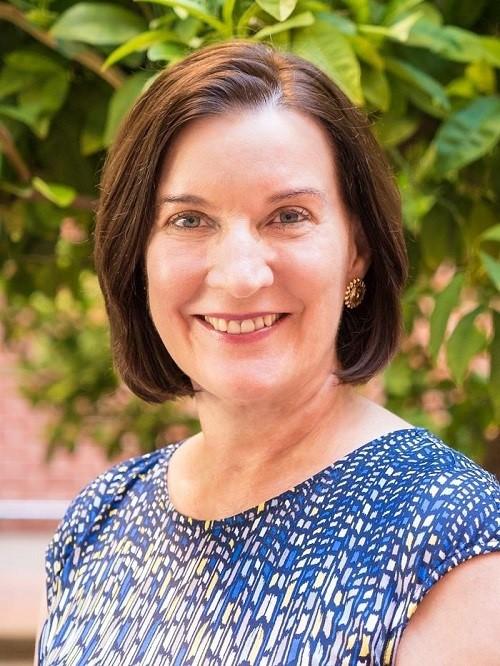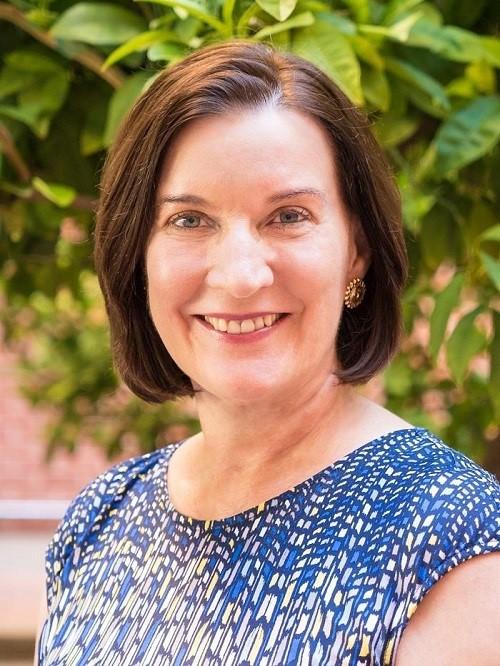
Credit: UA College of Nursing
Cancer survivors who suffer negative effects after treatment soon may have access to interventions with the potential to vastly improve their quality of life.
University of Arizona College of Nursing Professor Terry A. Badger, PhD, RN, PMHCNS-BC, FAAN, has received a $2.5 million grant from the National Cancer Institute to help improve symptoms for cancer survivors after their treatment.
Dr. Badger will employ the interventions and determine their effectiveness among ethnically diverse cancer survivors who have gone through medical treatment. One intervention will be made available in Spanish for the first time, Dr. Badger said.
Nearly 15.5 million American cancer survivors have experienced symptoms from cancer treatment that negatively impact their quality of life, according to the American Cancer Society. Although numerous symptom-management interventions have been tested during cancer treatment, few have addressed the continuing fatigue, pain, depression, anxiety, insomnia and other symptoms that continue after treatment has ended.
Dr. Badger, who also is a UA professor of psychiatry, will use two post-treatment innovations in her study. The first is a printed Symptom Management and Survivorship Handbook featuring evidence-based, self-care strategies for symptoms. The second is a more intensive intervention that combines the handbook with a telephone interpersonal counseling intervention for managing depressive symptoms.
Dr. Badger's interest in improving quality of life for cancer survivors began 18 years ago when she first conceived the idea of delivering interventions over the telephone. Many of Dr. Badger's previous studies focused on helping survivors during medical treatment. But in her latest work she examines the effectiveness of interventions post-treatment.
"One unique element of this study is that we are taking survivors after they have completed their chemotherapy, which is a time when they are transitioning back to their primary care provider. But they have a lot of unmet needs and lingering symptoms," she said.
Dr. Badger will examine the effectiveness of the two interventions for managing symptoms in an ethnically diverse – about 30 percent Hispanic – sample of cancer survivors of solid tumors at the end of chemotherapy. Though the telephone intervention may not be "high-tech," its accessibility has proven to be a boon to cancer survivors. An important part of Dr. Badger's work is removing barriers between patients and their care.
"All my work is developed to remove barriers so that survivors can get the supportive care they need in a cost-conservative, timely and convenient way," she said. "The Symptom Management and Survivorship Handbook is the first handbook of its kind to be made available for our Spanish-speaking cancer survivors. In fact, both interventions are delivered in either English or Spanish, depending on the survivor's preference."
In development for almost a year, the handbook is heavily illustrated and easy to navigate. It was translated by a certified interpreter and revised after a focus group was held with Spanish speakers.
"We have made incredible advances in treating cancer, and we are now at a point where many people survive a cancer diagnosis," said UA President Robert C. Robbins, MD. "However, many people still suffer from the very treatments that saved their life. The work that Dr. Badger is doing to help them as they move from being cancer patients to cancer survivors is addressing an important and unmet need. I am pleased to see that these interventions will be available in English as well as Spanish, which will help ensure that a greater number of people benefit from them."
Dr. Badger's team includes Chris Segrin, PhD, UA College of Social and Behavioral Sciences; Tracy E. Crane, PhD, UA College of Nursing; Pavani Chalasani, MD, MPH; UA Cancer Center; and Alla Sikorskii, PhD, Michigan State University Department of Psychiatry. The study began March 1 and has begun enrolling survivors.
"Thanks to this research, in the future we will be able to offer the right intervention, in the right dose, at the right time to our cancer survivors so that post-treatment symptoms can be reduced and healing hastened with these supportive interventions," Dr. Badger said.
Research reported in this release was supported by the National Cancer Institute of the National Institutes of Health under grant No. R01 CA225615-01.
The content is solely the responsibility of the authors and does not necessarily represent the official views of the National Institutes of Health.
###
About the University of Arizona College of Nursing
Established in 1957, the University of Arizona College of Nursing has been transforming nursing education, research and practice for 60 years to help people build better futures. Consistently ranked among the best programs in the nation, the college is strengthening health care's largest workforce and the public's most trusted profession through its undergraduate and graduate programs, offered online and on-campus in Tucson and Phoenix. Headquartered in Tucson, Ariz., where integrative health has been pioneered, the UA College of Nursing is home to the world's only Integrative Nursing Faculty Fellowship. With key focal strengths in integrative health, cancer prevention and survivorship, and nursing informatics, the college has more than 7,000 alumni worldwide promoting health and wellness in their workplaces and communities. For more information: http://www.nursing.arizona.edu
Media Contact
Jason Gelt
[email protected]
520-626-2742
http://uahs.arizona.edu/
Original Source
http://opa.uahs.arizona.edu/newsroom/news/2018/ua-college-nursing-receives-25m-grant-improve-interventions-cancer-survivors





